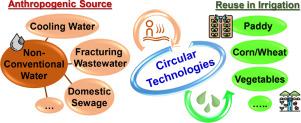Water Research ( IF 12.8 ) Pub Date : 2021-04-26 , DOI: 10.1016/j.watres.2021.117193 Chia-Yang Chen , Sheng-Wei Wang , Hyunook Kim , Shu-Yuan Pan , Chihhao Fan , Yupo J Lin

|
Due to the growing and diverse demands on water supply, exploitation of non-conventional sources of water has received much attention. Since water consumption for irrigation is the major contributor to total water withdrawal, the utilization of non-conventional sources of water for the purpose of irrigation is critical to assuring the sustainability of water resources. Although numerous studies have been conducted to evaluate and manage non-conventional water sources, little research has reviewed the suitability of available water technologies for improving water quality, so that water reclaimed from non-conventional supplies could be an alternative water resource for irrigation. This article provides a systematic overview of all aspects of regulation, technology and management to enable the innovative technology, thereby promoting and facilitating the reuse of non-conventional water. The study first reviews the requirements for water quantity and quality (i.e., physical, chemical, and biological parameters) for agricultural irrigation. Five candidate sources of non-conventional water were evaluated in terms of quantity and quality, namely rainfall/stormwater runoff, industrial cooling water, hydraulic fracturing wastewater, process wastewater, and domestic sewage. Water quality issues, such as suspended solids, biochemical/chemical oxygen demand, total dissolved solids, total nitrogen, bacteria, and emerging contaminates, were assessed. Available technologies for improving the quality of non-conventional water were comprehensively investigated. The potential risks to plants, human health, and the environment posed by non-conventional water reuse for irrigation are also discussed. Lastly, three priority research directions, including efficient collection of non-conventional water, design of fit-for-purpose treatment, and deployment of energy-efficient processes, were proposed to provide guidance on the potential for future research.
中文翻译:

农业非常规中水回用:循环水经济
由于对水供应的需求不断增长和多样化,非常规水源的开采受到了广泛关注。由于灌溉用水是总取水量的主要来源,因此以非常规水源用于灌溉目的对于确保水资源的可持续性至关重要。尽管已经进行了大量评估和管理非常规水资源的研究,但很少有研究回顾可用水技术对改善水质的适用性,因此从非常规供水中回收的水可以用作灌溉的替代水资源。本文对监管,技术和管理的各个方面进行了系统的概述,以实现创新技术,从而促进和促进非常规用水的再利用。该研究首先回顾了农业灌溉对水量和水质(即物理,化学和生物参数)的要求。根据数量和质量评估了五个非常规水的候选来源,即降雨/雨水径流,工业冷却水,水力压裂废水,工艺废水和生活污水。评估了水质问题,例如悬浮固体,生化/化学需氧量,总溶解固体,总氮,细菌和新出现的污染物。全面研究了提高非常规用水质量的可用技术。对植物,人类健康的潜在风险,讨论了非常规灌溉用水的环境。最后,提出了三个优先研究方向,包括有效收集非常规水,设计适合目的的处理以及部署节能过程,以为未来的研究潜力提供指导。


























 京公网安备 11010802027423号
京公网安备 11010802027423号